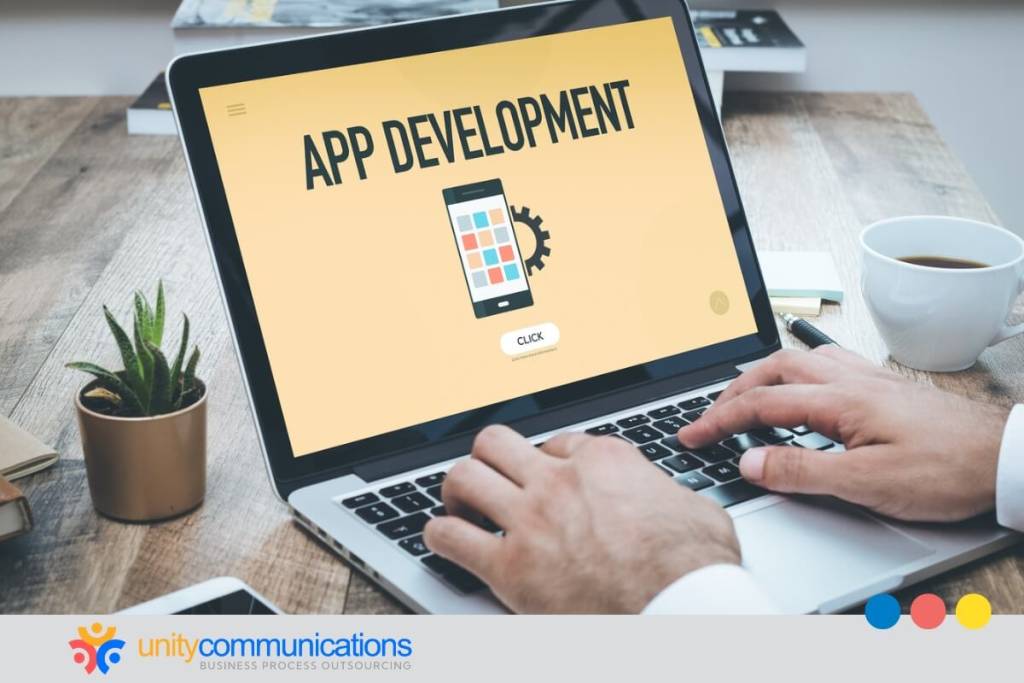Table of Contents
If you want to expand your business via a user-friendly mobile app, you can consider developing the software internally or leveraging business process outsourcing (BPO).
Outsourcing mobile app development allows businesses to engage highly skilled professionals possessing expertise and skill sets that differ from those of in-house teams. This setup is ideal if you aim to create a mobile application. It offers cost savings, accelerates time to market, and alleviates the burdens associated with app development.
This article discusses why you should consider outsourcing for your mobile app development needs. It also offers practical tips for ensuring a successful outsourcing partnership.
Benefits of outsourcing mobile app development

Mobile app development encompasses creating, designing, and maintaining applications intended for mobile devices such as smartphones and tablets. These applications offer tailored functionalities, providing a user-friendly and convenient way to access information, services, or entertainment.
Mobile app development follows several stages, including planning, wireframing, design, programming, testing, and deployment. Regular updates and enhancements are vital to ensure the app remains aligned with user preferences, incorporates emerging technologies, and adheres to evolving security standards.
The potential revenue growth and productivity boost applications can provide helped the mobile app development market grow to $197.2 billion in 2021.
According to the State of Mobile 2022 report, 233 applications generated over $100 million in annual consumer spending. Mobile apps also contribute to heightened business visibility, providing access to new markets and customers. Advanced developer tooling can significantly improve the efficiency and effectiveness of the development process, particularly in cases where mobile app development is outsourced.
Below are some of the benefits of outsourcing mobile app development.
Cost-effective solutions
One of the benefits of outsourcing is cost savings of up to 70%. Outsourced mobile app development is often cheaper than managing an in-house development team. However, it’s important to note that the actual cost-effectiveness can vary based on specific circumstances and the nature of the project.
Here are some reasons why outsourcing mobile app development might be more cost-effective:
- Labor cost differences. Outsourcing to regions with lower labor costs is a significant factor. Companies can outsource to countries with a lower cost of living, allowing them to access skilled developers at a fraction of the cost compared to hiring in more expensive markets.
- Overhead reduction. Outsourcing eliminates overhead costs associated with in-house teams, such as office space, equipment, insurance, and other benefits. The app development partner is responsible for managing these aspects.
- Economies of scale. Mobile app development companies often work on multiple projects simultaneously. This approach allows clients to benefit from economies of scale, resulting in cost savings.
Additionally, you can choose from various collaboration models. A collaboration model determines the payment structure for the app development team. Depending on your project’s characteristics, you can opt for a fixed fee, time and material, or a dedicated team approach.
Faster time to market
BPO organizations can accelerate the time to market for mobile app development through various strategies. Here’s how outsourcing speeds up the mobile app development process:
- Better access to skilled resources. BPO companies often have a pool of qualified and experienced professionals who specialize in different aspects of mobile app development. Businesses can expedite the development process by tapping into the skills of individuals with similar project experience.
- Faster recruitment and onboarding. Compared to hiring in-house, BPO firms can quickly assemble team members with the required skills for a specific project. They streamline the recruitment and onboarding processes, allowing for faster mobilization of resources.
- Dedicated development teams. BPO companies can provide dedicated development teams focused solely on a particular project or client. Due to the absence of multiple projects to divert team members, efficiency and progress can increase.
- Global development teams. BPO allows businesses to access a global talent pool, enabling them to work on projects around the clock. With teams in different time zones, development can continue 24/7, reducing overall project timelines.
- Specialized knowledge and tools. App development outsourcing companies often have access to specialized tools, technologies, and knowledge that can expedite the development process. These include advanced development frameworks, testing tools, and methodologies that may not be readily available in-house.
- Streamlined processes. BPO companies are experienced in optimizing and streamlining the app development process. They may have established workflows and best practices that can lead to faster and more efficient project execution.
- Reduced administrative tasks. BPO companies typically handle administrative tasks such as payroll, benefits, and human resources (HR)-related activities. They allow client organizations to save time and resources and focus more on development tasks.
Ongoing support and maintenance
BPO providers can be crucial in delivering ongoing support and maintenance for mobile app development. Here are ways in which outsourcing contributes to this aspect of mobile app development and maintenance:
- Dedicated support teams. BPO companies often offer dedicated support teams specializing in ongoing maintenance for mobile apps. These teams are trained to address various issues, from bug fixes to user support.
- 24/7 support. Many BPO providers operate globally, allowing them to provide 24/7 support for mobile apps. This capability ensures that users can receive assistance for their issues at any time, regardless of location.
- Issue tracking and resolution. BPO providers implement robust issue-tracking systems to monitor and resolve problems efficiently. They track user-reported issues, analyze app performance, and implement fixes promptly.
- Performance testing, monitoring, and optimization. BPO teams use monitoring tools to track the performance of mobile apps. They analyze metrics such as response times, error rates, and user engagement to identify areas for improvement and optimization and ensure a smooth user experience.
- Updates and enhancements. BPO providers can release updates and enhancements for mobile apps. They can implement new features, address user feedback, and ensure the app remains compatible with the latest devices and operating system versions.
- Security patching and compliance. BPO teams apply security patches and ensure the mobile app complies with the latest security standards. This process protects user data and maintains the app’s integrity.
- User training and assistance. Outsourced app development companies can help create and update user documentation, frequently asked questions (FAQs) pages, and training materials. These materials help users understand how to use the app effectively and minimize support requests for common issues.
- Backlog management. BPO providers manage the backlog of maintenance tasks, prioritizing issues based on severity and user impact. This function helps in allocating resources effectively to address critical problems first.
- Customer feedback analysis. BPO providers analyze user feedback and reviews to understand user sentiment and identify areas for improvement. This information is valuable for making informed decisions about future updates and enhancements.
Testing and quality assurance (QA)
So, what is BPO’s role in mitigating mobile app development risks? BPO companies employ various QA strategies and methodologies in mobile app development.
The goal is to deliver high-quality apps that meet client requirements, perform reliably, and provide a positive user experience. The following section discusses the key ways outsourcing ensures quality assurance in mobile app development:
- Testing strategies. BPO companies implement comprehensive testing strategies, including various types of testing such as functional testing, performance testing, security testing, and usability testing.
- Automated testing. Automation is often employed for repetitive and time-consuming testing tasks. Automated testing frameworks, tools, and scripts help ensure that critical functionalities are consistently tested across different devices and scenarios.
- Manual testing. Manual testing is crucial for exploring the app in real-world scenarios, identifying user experience issues, and conducting exploratory testing. BPO teams may combine automated and manual testing to achieve comprehensive coverage.
- Mobile device testing. BPO companies maintain diverse physical devices and use emulators and simulators to test the app on various platforms, screen sizes, and operating system versions. This process ensures compatibility and optimal performance across a wide range of devices.
- Continuous integration and continuous deployment (CI/CD). Implementing CI/CD pipelines enables outsourcing teams to automate building, testing, and deploying app updates in mobile app development. It also helps quickly identify and address issues arising during development.
- Code reviews and static analysis. BPO providers conduct thorough code reviews to identify potential issues and ensure adherence to coding standards. Static code analysis tools help identify code quality issues and potential vulnerabilities early in the development process.
- Regression testing. BPO teams perform regression testing to ensure new updates or features do not introduce unintended side effects or break existing functionalities. This type of testing is crucial for maintaining the overall stability of the app.
- Load testing. Load testing assesses the app’s performance under various load conditions, ensuring it can handle expected user traffic without degradation in speed or stability.
- Security measures. BPO providers implement security testing to identify and address vulnerabilities in the app. This process includes assessing data protection mechanisms, encryption practices, and protection against common security threats.
- QA Processes. BPO companies work closely with clients to understand their quality standards, expectations, and requirements. Collaborative QA processes ensure the delivered product aligns with the client’s vision and goals.
- Documentation and reporting. BPO teams maintain detailed documentation of test cases, test results, and any issues encountered during testing. This documentation helps track progress and facilitates effective communication between development and QA teams.
- Continuous training. QA teams in outsourcing firms receive ongoing training to stay updated on the latest testing methodologies, tools, and industry best practices in mobile app development. Training ensures they are equipped to handle the evolving landscape of mobile app development.
Global collaboration and market expansion
Outsourcing mobile app development can provide several opportunities for market expansion and collaboration. Here’s how:
- Access to global talent. BPO allows businesses to tap into a diverse pool of global talent. By collaborating with BPO teams worldwide, companies can access skilled developers, designers, and other professionals with diverse perspectives and expertise. This diversity can lead to innovative solutions and improved market competitiveness.
- Cost-effective expansion. Outsourcing mobile app development to regions with lower labor costs enables cost-effective expansion. Businesses can allocate resources efficiently, often getting high-quality work at a fraction of the cost compared to hiring in-house teams in more expensive markets.
- Scalability. BPO provides scalability, allowing businesses to quickly scale up or down based on project requirements. This flexibility is particularly valuable for market expansion, enabling companies to adapt to changes in demand and enter new markets without significant upfront investments.
- Access to new markets and industries. BPO providers have experience working with clients from various sectors and regions. Collaborating with such providers allows businesses to gain insights into new markets, user behaviors, and industry trends. This knowledge can be valuable when expanding into unfamiliar territories.
- Collaborative ecosystems. BPO can foster collaborative ecosystems where businesses work with various partners, including development teams, marketing agencies, and consultants. This collaborative approach enhances the overall value chain and can lead to more comprehensive and successful mobile app development projects.
- Risk sharing. Collaborating with BPO providers allows businesses to share certain risks associated with mobile app development. The BPO partner takes on responsibilities related to talent acquisition, project management, and other operational aspects, enabling the client to focus on strategic decision-making.
- Innovation hubs and centers of excellence. Some BPO providers establish innovation hubs or centers of excellence focusing on cutting-edge technologies and solutions. Collaborating with such firms can expose businesses to emerging trends and help them stay ahead in the competitive mobile app development landscape.
Strategies to ensure successful mobile app development outsourcing

The number of global mobile app downloads is 255 billion annually, indicating the importance of building your app.
Outsourcing mobile app development involves certain risks, ranging from project management challenges to potential security vulnerabilities. Here are key risk mitigation strategies that companies can employ to ensure successful and secure mobile app development:
- Vendor selection. Conduct a comprehensive evaluation of potential outsourcing partners. Consider their experience, track record, expertise in mobile app development, and references from previous clients. A thorough selection process helps in finding a reliable and capable outsourcing partner.
- Contractual agreements. Establish clear and detailed contractual agreements that outline project scope, timelines, deliverables, quality standards, and confidentiality clauses. A well-defined contract helps manage expectations and provides a basis for dispute resolution if issues arise.
- Data security measures. Implement robust data security measures to protect sensitive information during the development process. These include strict coding practices, encryption, and adherence to industry best practices for securing user data.
- Intellectual property (IP) protection. Clearly define IP ownership in the contract. BPO companies should respect and protect the client’s IP rights. The ownership and usage rights of any work produced during the project should also be specified.
- Project management tools and methodologies. Utilize effective project management tools and methodologies to ensure efficient collaboration and communication. Tools such as Jira, Trello, or Asana, coupled with Agile or Scrum methodologies, can enhance project visibility and coordination.
- QA and testing. Implement rigorous QA and testing processes to identify and address issues early in the development cycle. These functions include automated and manual testing to ensure the app meets quality standards.
- Regular audits and assessments. Conduct regular audits and assessments of the BPO provider’s processes, security measures, and overall performance. This helps identify areas for improvement and ensures ongoing compliance with agreed-upon standards.
- Contingency planning. Develop contingency plans for potential disruptions, such as changes in project scope, unexpected resource shortages, or external factors affecting the development process. Having plans in place helps minimize the impact of unforeseen events.
The bottom line

By implementing risk mitigation strategies, outsourcing teams and clients can navigate challenges in mobile app development and deliver successful projects while maintaining the process’s security, quality, and integrity. Regular monitoring and adaptation of strategies based on project dynamics contribute to long-term success in outsourcing engagements.
Let’s connect if you want to learn more about outsourcing!




